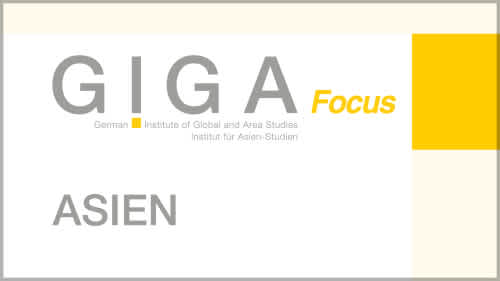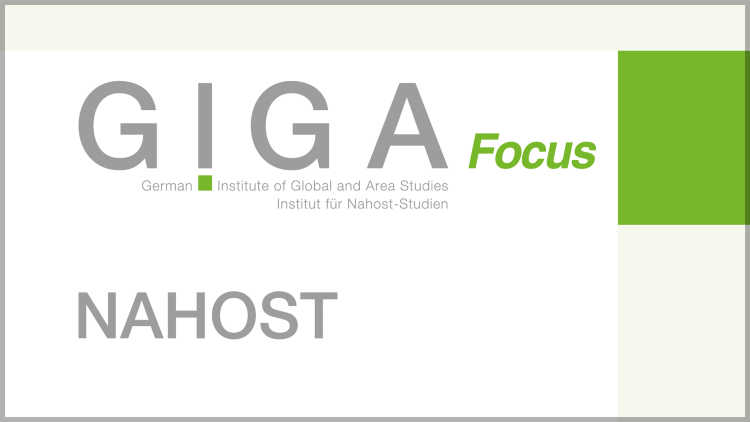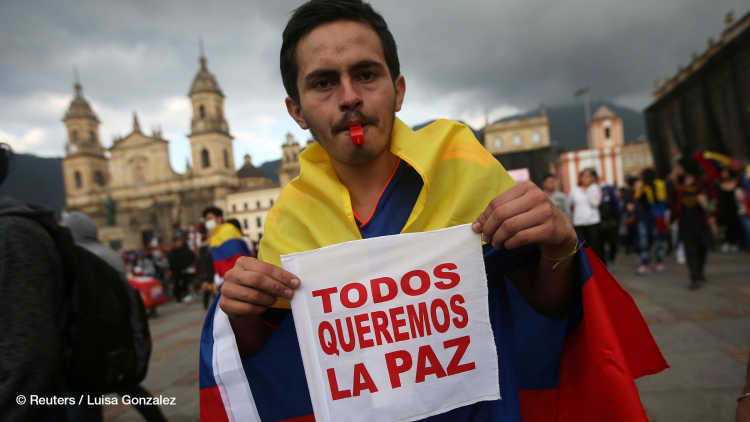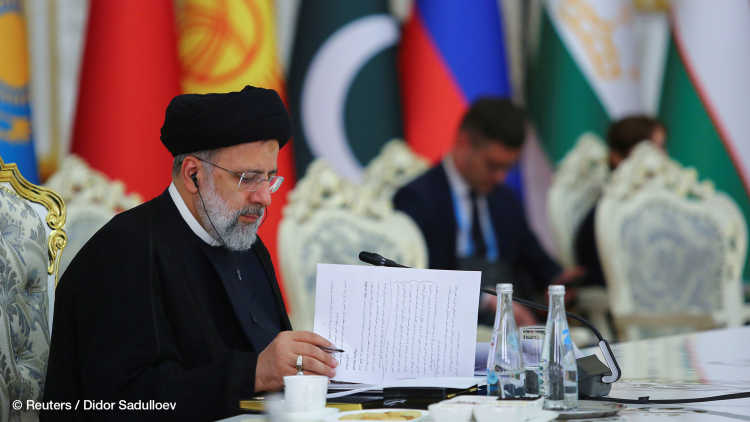- Home
- Publications
- GIGA Focus
- Indonesia’s Islamic Peace Diplomacy: Crafting a Role Model for Moderate Islam
GIGA Focus Asia
Indonesia’s Islamic Peace Diplomacy: Crafting a Role Model for Moderate Islam
Number 2 | 2023 | ISSN: 1862-359X

Indonesia, the world’s largest Muslim-majority nation, is continuously increasing its Islamic diplomacy portfolio. A central element herein is the deployment of a moderate Islam discourse for global peace. In doing so, the country seeks to weaken Arab dominance within Islamic discourse and rebrand itself as a progressive role model for the Islamic world.
The moderate Islam agenda for peace is characterised by the collaboration of state and non-state actors at the domestic and international level – despite their diverse understandings of what “moderate Islam” is.
Indonesia’s civil Islamic organisation Nahdlatul Ulama (“Revival of Islamic Scholars”) has recently transitioned from mere debating about moderate Islam to kicking off a global movement for reforming Islamic jurisprudence by interpretations that benefit all humans, regardless of religious affiliation. This includes the legitimisation of the United Nations Charter.
Indonesia’s internationalised Islamic higher education system is evolving as a central site for diplomatic practices. Islamic academia aims to disseminate a moderate Islamic message and position Indonesia as a peaceful soft power. Indonesia has thus inserted itself into the global competition over Islamic knowledge production. It directly challenges herewith established centres of Islamic higher education, such as Egypt, Iran, and Saudi Arabia.
The framing of Indonesia as a moderate, pluralist, and peaceful Muslim-majority country contrasts with the so-called conservative turn underway in Indonesian politics and society. This tension may weaken the progressive impulses of the moderate Islam discourse.
Policy Implications
Foreign policy stakeholders, international development agencies, and university staff should join Indonesia’s peace initiative. Indonesian Islamic actors should be considered partners in working towards realising the United Nations’ Agenda 2030 on sustainable development. In this context, the implementation of Sustainable Development Goal 16 (“peace”) is particularly suited for collaboration.
A Muslim Majority with an “Inferiority Complex”
In February 2023, Indonesia’s traditionalist Nahdlatul Ulama (“Revival of Islamic Scholars,” NU) – the world’s largest civil Islamic organisation, with approximately 90 million followers – celebrated its 100th anniversary in Surabaya (NU was founded in 1926, but the recent anniversary is in line with the Islamic calendar). On the occasion of these festivities, NU hosted an international conference on “Islamic Jurisprudence for a Global Civilisation: Assessing the Legitimacy of the United Nations Charter from Islamic Law,” attended by high-profile authorities from across the Islamic world. The conference aimed at publicly positioning NU as a supporter of the UN and its Charter, which emphasises international peace and cooperation. NU thereby acknowledged the political notion of the “nation-state,” the existing global system, and human rights while rejecting the transnational idea of caliphate and any alternative Islamist political order.
The conference, which predominantly took place in Arabic, constituted an Indonesian kick-off to mainstreaming within the Islamic world a peaceful outlook vis-à-vis the international order. The invitation of international Islamic authorities to Surabaya was the outcome of a self-critical internal NU debate contending that existing Islamic jurisprudence is not in line with the realities of the modern world. According to NU, conventional Islamic jurisprudence has problematic aspects that nurture intolerance, conflict, and violence, particularly between Muslims and non-Muslims. NU argues that it urgently needs reform from within to adapt to the circumstances of twenty-first-century life and to embrace humanitarian values. Islam, per the conference’s narrative, must contribute to solution-finding for today’s global challenges instead of being perceived by non-Muslims as a hindrance to peace and prosperity between people and nations.
In Indonesia itself, NU has been a pioneer in advocating a peaceful and progressive Islamic outlook. In 2019, it officially abrogated the concept of kafir (“unbeliever”), arguing that all Indonesians, regardless of their religion, are equal fellow citizens. By this, NU reasserted its loyalty to the Indonesian nation-state and its non-Islamic constitution. Furthermore, certain NU camps are taking a progressive stance on gender issues by being inclusive of LGBTIQ+ Muslims. Also, since 2017 NU’s youth wing, Ansor, has upheld the concept of “Humanitarian Islam,” which it communicates to an international audience through writings in the English language (Ansor 2017).
At the 2023 conference in Surabaya, NU’s leading board introduced to its international Muslim guests the concept of “Islamic Jurisprudence of Civilisation” (Fikih Peradaban) as a new moderate approach within Islamic law that shall contribute to the peace and well-being of all humanity. Also, from NU’s standpoint, Islamic rulings that run counter to these aims shall lose legitimacy. NU announced that, as the organisation steps into its second century of existence, it is seeking to take over greater responsibility in disseminating a peaceful Islam globally – and that the only effective way to reaching this goal is through reforming Islamic jurisprudence. Therefore, international gatherings on “Islamic Jurisprudence of Civilisation” will be organised regularly.
It is through peace-oriented conferences and theological discourses like these that NU tries to contribute to Islamic identity politics domestically as well as position Indonesia as a leading soft power within the Islamic world at large. At the international level, a moderate interpretation of Islam constitutes the central diplomatic instrument to promote Indonesia as a peaceful, progressive, and democratic Islamic role model and establish the country as new civilisational centre of the Islamic world. Despite its status as the largest Muslim-majority nation on Earth (280 million inhabitants, with 88 per cent adherents of Islam), Indonesia has not yet managed to position itself as a relevant Islamic actor on the international stage.
Due to its geographic remoteness from the Arab centre, its Austronesian-based culture, and the widespread infusion of Islam with locally rooted practices unknown elsewhere, Indonesia is commonly perceived as a periphery of the Islamic world. This image has impeded the country when it comes to shaping the discourse on Islam, politics, and development beyond its own borders. Although Indonesia has an outstanding community of publicly engaged progressive Islamic scholars, their intellectual contributions have not attracted attention in the international Islamic realm. This is also due to their use of the Indonesian language instead of Arabic. As a result, public debate in Indonesia attests to its own Muslim population having an “inferiority complex” when confronted with other nations. In book publications and on social media, Indonesian Islamic intellectuals lament that Indonesian Muslims are a majority with the mentality of a minority, suffering from low self-esteem. Also, foreign observers have characterised Indonesia as “the biggest invisible country on earth” – a term which has been adopted by Indonesian commentators too.
Reconnecting to the Past
For a few years now, however, Indonesian both state and non-state actors have been trying to overcome the country’s alleged inferior position within the Islamic world by taking the lead in organising international Islamic conferences, discussion formats, and inter-religious dialogues. This form of religious diplomacy has gradually increased Indonesia’s overall diplomatic influence in Asia, currently making it Southeast Asia’s most influential player in that regard. Accordingly, Indonesia’s overall power in Asia has grown: in the Lowy Institute Asia Power Index 2021, it obtained a top-ten placement for the first time (Lemahieu and Leng 2021).
A recent international Indonesia-organised conference that attracted global attention was the R20 (Religion of Twenty), an official Engagement Group of the G20 summit, that took place on 2–3 November 2022 on the island of Bali. At the R20, religious leaders from across the world gathered to discuss religion as a solution to global problems such as climate change, poverty, extremism, and terrorism. It aimed to promote solidarity and respect among the world’s people and nations, seeking to build a global alliance based on shared civilisational values (R20 2022). The R20 showcases the close collaboration between Indonesian state and non-state actors, as an NU initiative that enjoys the backing of the Joko Widodo government (2014−2024). With the R20, Indonesia has put religion in the spotlight with regards to world politics and set the agenda for upcoming G20 summits: the hosts of the next three, India (2023), Brazil (2024), and South Africa (2025), will follow the Indonesian example and arrange R20 meetings too.
It is with events like the R20 or the international Islamic conference on the UN Charter that Indonesian actors seek to reconnect to a past where their country once briefly emerged as a respected leader of the Global South. Not only was it the first of all colonised countries to proclaim its independence in 1945; under President Sukarno (1945–1967), Indonesia hosted in 1955 the Asian-African Conference in the city of Bandung, the first gathering of representatives of the Global South – without the West. By advocating its “independent and active”(bebas-aktif) foreign policy outlook, Indonesia stepped forward as a fulcrum for the Non-Aligned Movement and advanced South-South cooperation. The “Bandung Spirit” had repercussions for global politics and was a milestone in post–World War II developments (Van Reybrouck 2022).
Furthermore, in March 1965, NU in collaboration with the Indonesian government initiated a transregional Islamic meeting, the Africa-Asia Islamic Conference. It also took place in Bandung and sought to intensify solidarity and cooperation between the Islamic communities of the two continents. The delegates focused on Islamic proselytising, education, as well as culture, and agreed to establish an “Africa-Asia Islamic Organisation” with its headquarters in Indonesia. This plan – which would have positioned Indonesia as a hub of the Islamic world – was, however, never realised. Under President Suharto’s authoritarian New Order regime (1968–1998), Islam was banned from influencing foreign policy. The regime’s collapse in 1998 was a game changer for the political role of Islam, not only within the country but also in its formal diplomacy.
Peaceful Islam as a Diplomatic Tool
The policy decision to rebrand Indonesia as a peaceful centre of the Islamic world was driven by the complex interplay of domestic and international politics unfolding in the early years of the new millennium. Indonesia’s democratisation (1998–2004) overlapped with the Islamist 9/11 attacks that hit the United States in 2001. In the subsequent US-led global War on Terror, Indonesia became an ideological ally by its discursive condemnation of Islamism and support of Islam as a religion of peace. As Indonesia’s democratisation had to a significant extent been backed up by Islamic actors, the country came to serve in US eyes as a positive example of the compatibility of Islam and democracy. Furthermore, foreign observers highlighted the nation’s motto “Unity in Diversity” as well as the state ideology “Pancasila” – as aiming for peaceful relations between religious and ethnic communities since 1945. Pancasila is inscribed into the Indonesian Constitution; instead of mentioning “Allah,” it postulates a rather abstract belief in "the one and only God.” Also, the Indonesian Constitution recognises six religions (Islam, Protestantism, Catholicism, Hinduism, Buddhism, Confucianism).
Against this backdrop, Indonesia gained international repute as a highly diverse and peaceful Muslim-majority nation well-suited to being a role model for other Muslim countries. The positive perception of Indonesia as protective of religious diversity aligned with the interests of the latter’s state authorities and civil society actors. They see the Indonesian nation upholding such a peaceful image of the Islamic faith as a fitting strategy for raising the country’s status on the world stage and curbing the domestic Islamist movements that mushroomed after the collapse of authoritarianism. As Islamism threatened the consolidation of Indonesia’s young democracy, the internal security situation, and the country’s international image, an Islamic counternarrative was needed. A major step towards globally projecting Indonesia as a representative of a moderate, peaceful Islam was undertaken in 2002 when within the Ministry of Foreign Affairs a “Directory of Information and Public Diplomacy” was created. Since then, the Directory has collaborated with the Ministry of Religious Affairs and civil society actors such as NU and the country’s second-largest (approximately 50 million adherents) civil Islamic organisation, the modernist Muhammadiyah (“Followers of Muhammad”), on inter-religious dialogue and peace mediation via international conferences, workshops, and missions in conflict zones abroad.
Under President Susilo Bambang Yudhoyono (2004–2014) and his slogan “a million friends, zero enemies,” these formats experienced a high tide, catapulting Islamic civil actors into the international arena. In this context, before the re-emergence of the Taliban in Afghanistan in 2021, NU had been very active in promoting a peaceful Islam among Afghan Islamic scholars. Muhammadiyah has also engaged in mediation between Islamist guerrilla groups and both the Philippine and Thai governments. Also, both NU and Muhammadiyah have participated in international peace missions by sending delegations to Israel and Palestine to advocate non-violence and dialogue.
Moderate Islam Discourse: Collaboration across Concepts
As a result of these developments, discursive practices have emerged as a central tool in furthering Indonesia’s international image as a peaceful, modern, and democratic Muslim-majority country. Since 2015 particularly, a “moderate Islam” discourse has evolved that is incorporated into Indonesia’s diplomatic agency and soft-power strategy. This discourse is characterised by the involvement herein of a wide range of state and non-state actors, who adhere to different understandings and interpretations of “moderate Islam.” These moderate concepts of Islam evolved against the backdrop of the Islamic State’s (IS) emergence in the Middle East in 2014 as well as of the enduring threat posed by Indonesian Islamist groups. Despite the different connotations of moderate Islam, the involved actors collaborate in a joint effort to push back against Islamist ideology, protect the ideals embodied in the Pancasila, promote peace, and increase the country’s soft power abroad. They represent an alliance of centrist Indonesian Muslims who share the aim of globally spreading debate on the necessity of reconceptualising Islam along moderate and peaceful lines.
For instance, NU has come forth with the concept of “Islam of the Archipelago” (Islam Nusantara), an indigenous Indonesian Islam inclusive of pre-Islamic local practices. It legitimises local Indonesian culture like shadow plays or pilgrimages to the tombs of Indonesian saints, activities that are forbidden by stricter interpretations of the faith. At its core, it rejects attempts to “Arabise” Indonesia and calls for peaceful religious and cultural coexistence – both in and beyond Indonesia. Muhammadiyah stands for a “Progressive Islam” (Islam Berkemajuan) meanwhile. In contrast to “Islam of the Archipelago,” it is more future-oriented and in dialogue with practical Indonesian (social) politics while also identifying as moderate and democratic. Moreover, it has a universalist economic-development orientation and is urban and business-focused. Muhammadiyah’s internationalisation and peaceful global outreach are central aspects of its “Progressive Islam”approach (Muhammadiyah 2022). While NU and Muhammadiyah represent different theological currents within Islam and were originally competitors in the religious realm, as regards the overall moderate Islam discourse they collaborate closely. They emphasise the shared peaceful goals of their distinct interpretations of moderate Islam, showcasing joint engagement to promote Indonesia as an international role model.
Also, while Indonesian understandings of moderate Islam differ from one another, they all refer to the Qur’an-mentioned “Islam of the Middle Path” (Islam Wasathiyah). Traditionally, Egypt’s al-Azhar University has been the main promoter of this concept; recently, however, Indonesia has endeavoured to take over this role. This not only manifests in NU’s and Muhammadiyah’s intense referencing of it; the Majelis Ulama Indonesia (“Indonesian Council of Islamic Scholars,” MUI), a semi-state body that publishes non-binding Islamic legal rulings and consists of members of NU, Muhammadiyah, and other organisations, has since appropriated the concept too.
Furthermore, the Widodo government supports the incorporation of moderate Islamic concepts into its diplomacy. While the current president, to speak to the large domestic constituencies of NU and Muhammadiyah, has discursively aligned with “Islam of the Archipelago” and to a lesser extent “Progressive Islam,” since 2018 he has intensified identification particularly with“Islam of the Middle Path.” Due to its legitimisation by the Qur’an, the government uses the conceptas a discursive platform for uniting moderate and peaceful Muslims from Indonesia’s diverse Islamic camps and indeed across nations (Kassim 2018). In 2018, for instance, Widodo invited 100 scholars from around the world to the presidential palace to deliberate on religious tolerance, anti-violence, and moderation from a “Middle Path” perspective. In addition, the government put in place the “Religious Moderation” (Moderasi Beragama) policy and made it a key objective of the National Medium-Term Development Plan 2020–2024. It seeks to mainstream religious diversity and tolerance, as applying to all faiths. A key agent overseeing this policy is the Ministry of Religious Affairs, which tries to shape societal discourse on religious moderation through public talks and Open Access publications (Hasyim and Saat 2020). In practice, the promotion of a lifestyle based on a moderate “Islam of the Middle Path” is a central element of the policy.
The latest development within the moderate Islam discourse is NU’s concept of “Islamic Jurisprudence of Civilisation,” which also sees itself in the tradition of “Islam of the Middle Path.” However, by directly targeting the concrete reform of Islamic jurisprudence, it consciously goes a step beyond “mere talk.” Furthermore, through its approach of combining the scientific tradition of classical Islamic jurisprudence and the values of the UN Charter, alongside its focus on collaboration between nations, it has by design been created for an international audience. Most centrally, its emphasis on benefitting all of humankind regardless of religious affiliation lends the concept a distinct diplomatic quality.
Islamic Universities: Emerging Diplomatic Actors
Within Indonesia’s diplomatic toolbox and soft-power approach, a new subgroup of actors has recently emerged: Islamic universities. In the Islamic world, soft power is to a significant extent constituted by the international attractiveness of centres of Islamic knowledge production. Accordingly, Indonesia has started crafting the image of it being an international Islamic knowledge hub. In doing so, Indonesia directly challenges the dominance of established centres of Islamic education and intellectualism such as al-Azhar University in Egypt, al-Qarawiyyin University in Morocco, al-Zaytuna University in Tunisia, as well as the many Islamic universities of Iran and Saudi Arabia.
In Indonesia, universities are traditionally perceived as key public agents and development actors. Besides non-religious universities, the country is home to the world’s largest network of state-sponsored Islamic universities, institutes, and colleges as well as dozens of private Islamic universities managed by NU and Muhammadiyah respectively. In the past, these establishments have promoted development and democratisation nationally as well as mediated foreign academic influences, particularly from the US, Canada, the Netherlands, and the Arab world. Over a number of decades, Indonesian students and lecturers have been sent abroad to study Islam – also to the West. Recently, Indonesian Islamic academia has sought to emancipate itself from this foreign sway. It strives to reverse the flow of input from abroad by producing its own academic approaches that combine Arab-Islamic and Western elements. Accompanied by an Indonesian cultural twist and a peaceful framing of Islam, they increasingly target not only national but now also international Islamic audiences.
A flagship higher-learning institution representative of this new export-oriented academia is the Indonesian International Islamic University (IIIU) that opened in 2021 in Depok, close to Jakarta. Calling itself a “diplomacy campus” in the tradition of the “independent and active” Indonesian foreign policy narrative, it maintains academic collaborations across the Sunni–Shi’i spectrum – including with Iran, Saudi Arabia, and the West. Students come from across the Islamic world, with non-Muslim ones being explicitly welcome on campus to help strengthen inter-religious dialogue and peace. The IIIU’s four faculties offer both Islamic and non-religious MA and PhD study programmes. Each first-semester student is obliged to follow a course on “Islam of the Middle Path,” which also explains Indonesia’s culture and politics. By this course and their positive experiences on campus, it is hoped that on their return to their home countries foreign graduates become “ambassadors of Indonesia” (Allès and tho Seeth 2021).
The campus itself is a site of diplomatic practice. Officially appointed ambassadors to Indonesia pay visits and exchange gifts with academics. In these instances, IIIU academics function as informal Indonesian diplomats. Manifold forms of international academic cooperation striving for the enhancement of bilateral relations showcase the phenomenon of “science diplomacy” – the interaction of science and international relations, including the search for international scientific solutions to global problems. In the case of IIIU, science diplomacy currently manifests in the joint academic exchange on and dissemination of a moderate Islam narrative for global peace.
Alongside their dense networks of Islamic schools, NU and Muhammadiyah maintain their own private Islamic universities. Their campuses are also now undergoing greater internationalisation. This global outlook is underpinned by scholarship programmes targeting foreign Muslim students from (post-)conflict settings or who belong to marginalised communities. NU and Muhammadiyah understand their scholarships for Palestinian, Thai, or Filipino Muslim students, among others, as an indirect form of development aid. Muhammadiyah universities have also started to expand their international outreach by establishing branch campuses: in 2021, the first one abroad opened in Malaysia; in 2022, the second to do so was in South Korea. The internationalisation of the Indonesian Islamic higher education system is a self-confident step towards greater visibility of the country’s moderate Islam discourse and lends the Islamic academic milieu a central role within diplomatic affairs.
Moderates versus Conservatives
Indonesia’s self-branding as an inherently moderate, pluralistic, and peaceful Muslim-majority nation is critically observed by Indonesian and foreign experts, who point to the ongoing conservative Islamic turn the country has been experiencing since the collapse of authoritarianism. This conservative turn manifests in the law, consumer culture, and many Indonesian Muslims’ intolerant attitudes towards religious and sexual minorities. These groups suffer from legal and social discrimination, which triggers conflict and occasionally violent escalation (Formichi 2021).
President Widodo’s governance style vis-à-vis religion and human rights is marked by tensions. On the one hand, he publicly supports the narrative of a moderate and pluralistic Indonesian Islam alongside having initiated the legal recognition of indigenous beliefs and banning long-standing controversial Islamist groups. On the other, like his predecessor Yudhoyono, Widodo also makes concessions to the conservative Islamic camp, which does not always clearly distance itself from acutely anti-pluralistic Islamist groups. In 2018, Widodo chose conservative MUI chair Ma’ruf Amin, who was simultaneously the leader of NU, as his vice-presidential running mate in his re-election campaign. Amin had become a controversial figure earlier as he had been supportive of Islamic legal rulings against the rights of Muslim minorities – Ahmadiyah and Shi’a – and LGBTIQ+ people. Also, in 2016, he called for the arrest of Jakarta’s governor Basuki Tjahaja Purnama, a Christian of Chinese ethnicity. Shortly before his likely re-election as governor, social media users accused Purnama of blasphemy against Islam. Amin’s condemnation encouraged conservatives and hardline Islamists to organise mass protests against Jakarta’s governor. As a result of the campaign against him, Purnama lost the election and was sentenced to two years in prison after a dubious criminal case. The latest coup in the furthering of this conservative turn would be the passing of a new criminal code in December 2022. Indonesian and international observers deem this legislation a violation of the rights of religious minorities, women, and LGBTIQ+, undermining their freedom of speech and association (Human Rights Watch 2022).
The role of NU and Muhammadiyah in this conservative turn is not always clear-cut. Due to their huge size, both organisations are internally split into heterogenous wings and currents, including conservative and anti-pluralistic voices. While NU’s and Muhammadiyah’s overall peaceful and progressive agency must be acknowledged, they operate within the same patronage system as other actors who are not of like mind. Therefore, they are at times willing to forgo civic pluralism and protect Muslim control over Muslim-majority regions when their interests and position are threatened (Menchik 2019). Surveys on religious attitudes have found that Indonesian Muslims are neither exceptionally tolerant nor intolerant. They are about as tolerant as one would expect for a newly democratic country. As elsewhere, Indonesian Muslims with a higher education and good income are the most tolerant. However, Indonesia is distinct as NU and Muhammadiyah leaders are more tolerant than their counterparts in other Muslim-majority countries, and they have been active in promoting the rights of religious minorities (Menchik and Trost 2018).
Analyses on the quality of Indonesia’s democratic system attest to a concerning trend of decline here. The country shows signs of being an illiberal democracy with limited freedom of religion, a failure to uphold the rule of law, and weakly institutionalised parties. In comparison with the rest of Southeast Asia and the Islamic world, however, Indonesia’s democratic quality still holds up well (Setiawan and Tomsa 2022).
Indonesia as a Partner for Global Peace
As Indonesia finds itself in a state of ideological contestation between progressive democratic forces and anti-democratic conservatives and Islamists, its message of a moderate and peaceful Islam is under threat. Notwithstanding the many problematic developments on the ground, the country is home to an array of well-organised both state and non-state actors who are genuinely committed to spreading peace between religions, cultures, and nations. The evolution of an Indonesian Islamic peace diplomacy must also be understood as an invitation to foreign stakeholders to jointly build an international alliance for global peace.
International development agencies and academic networks need to take peace-oriented Indonesian Islamic actors more seriously and integrate them into constructive partnerships. If they do so, they will not only support the moderate counternarrative against intolerant and anti-pluralistic religious trends in and beyond Indonesia. They will also profit from the long-standing experience of and know-how on peaceful approaches to religion that many Indonesian actors bring to the table. As 80 per cent of the world’s population profess following a faith, religious actors constitute a key element in strengthening global peace.
The UN’s Agenda 2030, with its 17 Sustainable Development Goals (SDGs), particularly needs competent religious partners to further sustainable development within religious communities around the globe. As “peace” is an explicit sustainable development goal (SDG 16), there is ample room to include Islamic peace actors from Indonesia. The intersection of the fields of “education” (SDG 4) and “peace” may be considered a specific point of departure for collaboration with these Indonesian actors. Notwithstanding the diversity of the Indonesian state-sponsored and private Islamic education system, peace and democracy education feature strongly in the country. This is particularly the case in education institutes managed by NU and Muhammadiyah, as well as within the state-sponsored Islamic higher education system. If Indonesia wants to continue crafting the image of it being an Islamic role model, its education system should be a focus of intensified peace work. The role of Islamic universities and their national and international outreach will be central here.
Footnotes
References
Allès, Delphine, and Amanda tho Seeth (2021), From Consumption to Production: The Extroversion of Indonesian Islamic Education, in: TRaNS: Trans−Regional and −National Studies of Southeast Asia, 9, 2, 145–169.
Ansor (2017), Gerakan Pemuda Ansor Declaration on Humanitarian Islam, accessed 16 January 2023.
Formichi, Chiara (ed.) (2021), Religious Pluralism in Indonesia: Threats and Opportunities for Democracy, Ithaca: Cornell University Press.
Hasyim, Syafiq, and Norshahril Saat (2020), Indonesia’s Ministry of Religious Affairs under Jokowi, Singapore: ISEAS Publishing.
Human Rights Watch (2022), Indonesia: New Criminal Code Disastrous for Rights: Provisions Harmful to Women, Minorities, Free Speech, accessed 16 January 2023.
Kassim, Yang Razali (2018), Indonesia’s Campaign for Centrist Islam goes Global, East Asia Forum, 16 November, accessed 16 January 2023.
Lemahieu, Hervé, and Alyssa Leng (2021), Lowy Institute Asia Power Index: Key Findings 2021, accessed 16 January 2023.
Menchik, Jeremy (2019), Muslim Moderates and Democratic Breakdown in Indonesia, in: Asian Studies Review, 43, 3, 415–433.
Menchik, Jeremy, and Katrina Trost (2018), A ‘tolerant’ Indonesia? Indonesian Muslims in Comparative Perspective, in: Robert W. Hefner (ed.), Routledge Handbook of Contemporary Indonesia, London and New York: Routledge, 390–405.
Muhammadiyah (2022), Risalah Islam Berkemajuan, Jakarta and Yogyakarta: PP Muhammadiyah.
R20 (2022), R20 Bali Communiqué, accessed 16 January 2023.
Setiawan, Ken M.P., and Dirk Tomsa (2022), Politics in Contemporary Indonesia: Institutional Change, Policy Challenges, and Democratic Decline, Oxon and New York: Routledge.
Van Reybrouck, David (2022), Revolusi: Indonesien und die Entstehung der modernen Welt, Berlin: Suhrkamp.
Editor GIGA Focus Asia
Editorial Department GIGA Focus Asia
Regional Institutes
Research Programmes
How to cite this article
tho Seeth, Amanda (2023), Indonesia’s Islamic Peace Diplomacy: Crafting a Role Model for Moderate Islam, GIGA Focus Asia, 2, Hamburg: German Institute for Global and Area Studies (GIGA), https://doi.org/10.57671/gfas-23022
Imprint
The GIGA Focus is an Open Access publication and can be read on the Internet and downloaded free of charge at www.giga-hamburg.de/en/publications/giga-focus. According to the conditions of the Creative-Commons license Attribution-No Derivative Works 3.0, this publication may be freely duplicated, circulated, and made accessible to the public. The particular conditions include the correct indication of the initial publication as GIGA Focus and no changes in or abbreviation of texts.
The German Institute for Global and Area Studies (GIGA) – Leibniz-Institut für Globale und Regionale Studien in Hamburg publishes the Focus series on Africa, Asia, Latin America, the Middle East and global issues. The GIGA Focus is edited and published by the GIGA. The views and opinions expressed are solely those of the authors and do not necessarily reflect those of the institute. Authors alone are responsible for the content of their articles. GIGA and the authors cannot be held liable for any errors and omissions, or for any consequences arising from the use of the information provided.






















